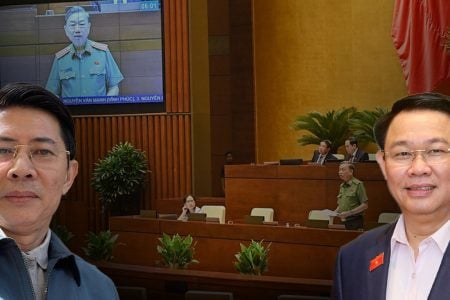
Vietnam will continue not to choose sides in strategic competition between major powers, Prime Minister Pham Minh Chinh affirmed in directing the diplomatic branch, adding that Vietnam’s foreign policy “must put the national interest- nation above all else.”
Chinh made this statement on December 15 at the National Foreign Affairs Conference that opened on December 14. This is the first time the Communist Party of Vietnam has organized an intensive conference on foreign affairs on such a national scale.
In addition to the presence of Mr. Chinh, the conference also gathered top leaders of Vietnam including General Secretary Nguyen Phu Trong, President Nguyen Xuan Phuc, Standing Secretary of the party’s Secretariat Vo Van Thuong, and Standing Deputy Prime Minister Pham Binh Minh.
Accordingly, Mr. Chinh once again emphasized that “Vietnam has steadfastly implemented the foreign policy of independence, self-reliance, multilateralization, and diversification.” According to this line, Vietnam adheres to the principle of “three Nos” i.e. not joining alliances, not joining one country against another, and not allowing foreign countries to set up military bases on its territory.
“The spirit is that we don’t choose sides but the great right of the times, which is peace, friendship, cooperation, and development,” Chinh was quoted as saying by the Government Portal.
The PM called on the diplomatic sector to “see the national interests as paramount” and “to firmly protect Vietnam’s sovereignty, territorial integrity, legitimate rights, and interests.”
He asked the Vietnamese diplomatic staff to do what “so that friends and international partners can increase trust and love Vietnam, understand and support Vietnam’s path to socialism.”
He also commended Vietnam’s diplomacy for effectively implementing the strategy of “vaccine diplomacy” to take advantage of vaccine supplies from many countries around the world, thereby helping Vietnam from a slower starting point than many countries to the group of countries with high vaccination rates, also reported by the Government Portal.
Country’s New position
Earlier, at the opening session of the conference, General Secretary Nguyen Phu Trong asked Vietnam’s diplomatic sector to treat other countries in a manner commensurate with the country’s new position.
“Our country’s position and power on important criteria such as economy, population, defense, and foreign affairs have changed much after 35 years of renovation. In particular, issues of Vietnam’s core and strategic interests require our country to show a stronger voice and more active foreign policy stance, first of all in the region,” Trong was quoted by the Government Portal.

The head of the Communist Party of Vietnam set out goals for Vietnam’s foreign policy to “cooperate and fight at the same time” and “identify the right enemies (to fight) and partners (to cooperate)”, and “continue to create an interweaving position of strategic interests between Vietnam and other countries.”
“The overarching goal is to maintain a peaceful, stable and favorable environment for the cause of national construction and defense, to carry out strategic tasks on socio-economic development; at the same time, resolutely and persistently defend firmly our independence, sovereignty, sovereign rights, territorial integrity, and legitimate interests in accordance with international law,” Trong was quoted as saying at the meeting. recommended.
On the issue of territorial sovereignty disputes with China in the East Sea (South China Sea), Trong instructed that “must always be persistent, calm, wise and clever.”
Mr. Trong is said to have cited the image of Vietnamese bamboo “soft, but very resilient” to call for the building of “Vietnamese bamboo diplomacy” – that is, “fight and steadfast but flexible and creative.”
Vietnam currently has strategic partnerships with most major countries in the world such as the UK, France, China, Russia, Japan, India, Korea, Australia… The relationship with China is even higher than a ‘” comprehensive strategic partnership‘” while relations with the US, despite recent warm developments, are still at the level of a “comprehensive partnership,” not yet a “strategic partner.”
The United States and China continue to be the two countries with the most trade relations with Vietnam, and like many other Southeast Asian countries, Hanoi must find a way not to fall into a strategic competition between the two superpowers.
On the international stage, Vietnam is about to end its term as a non-permanent member of the United Nations Security Council and assumed the role of rotating chair of ASEAN in 2020.
Vietnam is also one of the very few countries in the world that participates in all free trade agreements with major economic blocs, including the Comprehensive and Progressive Agreement for Trans-Pacific Partnership (CPTPP with 11 countries including Japan, Australia (withdrawn by the US), the Free Trade Agreement with the European Union (EVFTA) and the Regional Comprehensive Partnership Agreement (RCEP) with China.
At the conference, leaders of ministries, branches, localities, ambassadors, and diplomats presented comments on the world political and economic situation, opportunities, and challenges for Vietnam and the world, propose guidelines for Vietnam’s foreign policy in the new situation.
Thoibao.de (Translated)




























